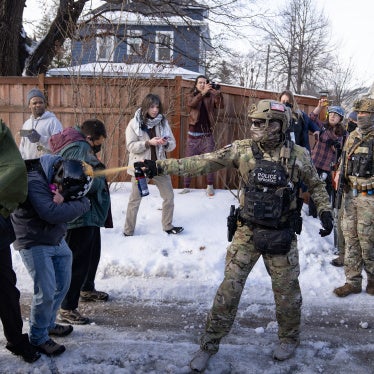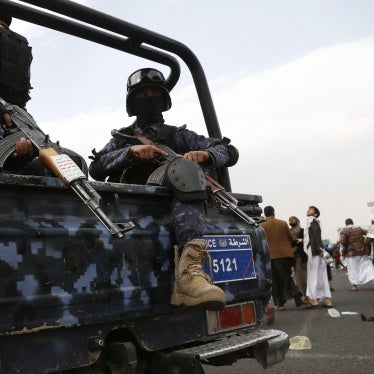Human Rights Watch praised President Clinton for his spirited debate on human rights with Chinese President Jiang Zemin but urged him to press further on four of the issues he raised: freedom of expression and association; arbitrary detention; Tibet; and freedom of religion.
"It is premature to call the summit a success in human rights terms, although we're delighted President Clinton spoke out as pointedly as he did, especially on live television," said Sidney Jones, Asia director of Human Rights Watch. "The challenge is now to take the issues that are on the table now and use the summit to secure concrete progress on all four. We obviously don't expect all problems to be solved in a nine-day visit, and we realize human rights is only one of many topics on Mr. Clinton's agenda. But the President has demonstrated that U.S.-China relations can be strengthened even as differences are fully and forcefully aired. Now he and his staff should use the remaining days in China to get down to hard negotiations on human rights, so that he returns to Washington with more than vague promises of dialogue and exchange." She noted that of the fourteen agreements announced Saturday, only two related to human rights, and neither addressed ongoing abuses.
In each of the four areas, Human Rights Watch gave examples of what could be done.
1. Freedom of expression and association
The organization gave Mr. Clinton high marks for his assertion that the Tiananmen crackdown was wrong and for arguing that "stability in the twenty-first century will require high levels of freedom" in China. In the spirit of those remarks, Mr. Clinton, before leaving China, should get his hosts to lift the ban on Chinese pro-democracy activists abroad from returning home, arguing that many of these exiles are well-placed to provide the ideas for reform that will be critical to China's future. He should also secure a commitment that there will be no retaliation against Chinese in Xian, Beijing, Shanghai and elsewhere who dared to give interviews to Western journalists or in other ways speak out during the president's trip. (Human Rights Watch is particularly concerned about Bao Tong, the former Chinese Communist Party official who called for political reform in recent interviews; Ding Zilin, an advocate on behalf of the 1989 victims, who was reportedly ordered not to leave her home until Clinton departs Beijing; and Xu Wenli, a long-time activist.) And he should ensure that the rule of law programs to which the administration is committed include a focus on the rights guaranteed by the international treaty that China has promised it will sign later this year, the International Covenant on Civil and Political Rights.
2. Arbitrary detention
President Clinton noted he had raised with President Jiang Zemin the problem of people "incarcerated now for offenses no longer on the books in China" as well as those detained since 1989 for non-violent offenses, and said he asked if these people could be released. Now he should
step up efforts to secure those releases. He should also ensure that any public references to agreed on law programs be used not just to praise legal reforms already in place but to press for an end to the problems that remain, including the system of "re-education through labor," an administrative punishment of up to three years' detention in a labor camp for those who run afoul of authorities. The President could offer assistance to the Chinese government, as he implicitly did in the question-and-answer session on Saturday, to find a legal mechanism for review of the cases of the 2,000 so-called "counterrevolutionaries" -- a small fraction of the total number of political prisoners in China -- who remain in prison even though the offense of "counterrevolution" was removed from China's criminal law last year.
3. Tibet
Since the issue of Tibet was discussed at greater length than any other rights issue, the groundwork has been laid to pursue three issues of particular importance: release of Tibetan prisoners who have not used violence; securing verifiable information on the whereabouts and current status of the nine-year-old Panchen Lama, the second highest figure in Tibetan Buddhism; and securing improved access to Tibet for the international press and human rights organizations. (Access by the press to the Panchen Lama would be one way of verifying official Chinese government claims that the boy is leading a normal life.)
4. Freedom of Religion
President Clinton raised the issue of freedom of religion in broad terms,in the context of his remarks during the Saturday press conference as well as his own attendance at an "official" church in Beijing. Given subsequent remarks by Chinese officials that religious activists detained in China are not being held for their beliefs, President Clinton needs to find a way during his remaining days to rebut the Chinese government's position that freedom of religion is the same as freedom to believe, whereas in fact it embraces freedom to meet, train leaders, educate followers, and distribute material. He should also find a way of stressing that he is concerned over restrictions on the freedom of all religions in China -- Buddhism, Islam, and Daoism, as well as Christianity.
"We have been concerned that the Clinton administration has seemed willing to sacrifice targeted pressure on human rights for an ill-defined 'human rights dialogue,' " said Jones. "President Clinton should came back from China with some concrete commitments from the Chinese government and a clearly articulated human rights policy that directly addresses each of the issues he raised with President Jiang."








